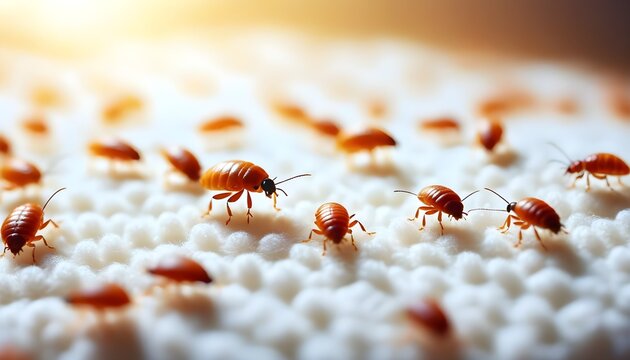Don’t Let the Bed Bugs Bite: Identifying, Treating, and Preventing Infestations in Singapore

Bed bugs are a persistent problem in Singapore, and their bites can cause significant discomfort. While these tiny pests may not transmit diseases, they can quickly turn a peaceful night’s sleep into a nightmare. Bed bugs feed on human blood, and their infestations can spread rapidly if not addressed. Identifying, treating, and preventing bed bug infestations is crucial to maintaining a healthy and pest-free home. This guide will help you understand bed bugs and how to effectively handle an infestation with the help of a professional pest control service in Singapore.
What Are Bed Bugs and How Do They Infest?
Bed bugs are small, wingless insects that typically live in cracks and crevices around beds, furniture, and even walls. These pests are reddish-brown and can grow up to 5-7 millimeters long. Despite their small size, they are visible to the naked eye. Bed bugs are primarily nocturnal, feeding on the blood of humans and animals during the night. Their bites may not be immediately noticeable, but the symptoms usually appear hours or days later in the form of red, itchy welts.
In Singapore, bed bug infestations are becoming more common due to increased travel and densely populated living conditions. Bed bugs can hitch a ride on luggage, clothing, and furniture, quickly spreading from place to place. Once inside a home, they breed rapidly, with a single female bed bug laying up to 200-500 eggs in her lifetime.
Signs of Bed Bug Infestation
Early detection is key to controlling bed bug infestations before they get out of hand. Here are common signs of bed bugs to watch for:
- Bite Marks: Bed bug bites usually appear as small, red welts, often in a line or cluster. They are typically found on exposed areas of the skin, such as the arms, legs, neck, and face. These bites can be itchy and uncomfortable but are often mistaken for mosquito bites or allergic reactions.
- Bloodstains and Fecal Spots: After feeding, bed bugs may leave behind bloodstains on your bedding. You may also notice dark or rusty spots of bed bug excrement on sheets, mattresses, and nearby furniture.
- Shed Skins and Eggs: Bed bugs shed their exoskeletons as they grow. You may find these discarded skins, which resemble translucent bed bugs, along with tiny, white eggs around the edges of your mattress, box spring, or bed frame.
- Musty Odor: In larger infestations, bed bugs emit a sweet, musty odor similar to that of coriander. If you notice an unusual smell in your bedroom or other parts of your home, this could be a sign of an infestation.
Treating Bed Bug Infestations
Once a bed bug infestation is confirmed, it’s essential to act quickly to prevent it from spreading further. While some people may attempt DIY methods, such as over-the-counter insecticides or natural remedies, these are often ineffective in eliminating the entire infestation. The most reliable solution is to hire a pest control service in Singapore that specializes in bed bug extermination. Here’s what to expect during professional treatment:
1. Inspection and Identification
The first step in any effective pest control service is a thorough inspection of your home. Trained technicians will identify all areas of infestation, including hard-to-reach places such as cracks, electrical outlets, and behind wallpaper. Early identification ensures that the infestation is treated comprehensively and reduces the likelihood of the bed bugs returning.
2. Chemical Treatments
Professional pest control companies use specialized insecticides that are designed to kill bed bugs at all stages of their life cycle, including eggs. These chemicals are often applied to mattresses, bed frames, baseboards, and other areas where bed bugs are likely to hide. Pest control professionals have access to potent, safe products that aren’t available to the public, ensuring better results.
3. Heat Treatment
Another effective method for eliminating bed bugs is heat treatment. Bed bugs and their eggs cannot survive extreme temperatures. By raising the temperature of the infested area to at least 50°C, a pest control service can kill all bed bugs in just a few hours. Heat treatment is especially useful in large infestations and is a chemical-free option for homeowners concerned about pesticide use.
4. Follow-Up Visits
Because bed bugs are so persistent, it may take multiple treatments to completely eradicate the infestation. A professional bed bugs pest control Singapore service will schedule follow-up visits to ensure that the treatment is working and that no bed bugs remain.
Preventing Future Bed Bug Infestations
Once the infestation is under control, preventing bed bugs from returning is essential. Here are some tips to keep your home bed bug-free:
1. Inspect Secondhand Furniture
Bed bugs often hitch a ride into homes through secondhand furniture. Always inspect used items such as sofas, mattresses, and chairs for signs of bed bugs before bringing them into your home. Pay close attention to seams, tufts, and crevices where bed bugs might hide.
2. Be Cautious When Traveling
Bed bugs are notorious for spreading through travel. When staying in hotels, inspect the mattress and bedding for signs of bed bugs. Keep your luggage elevated off the floor and away from the bed. Once you return home, wash all clothing in hot water and inspect your luggage for any hitchhiking pests.
3. Declutter Your Home
Bed bugs thrive in cluttered environments where they can easily hide. Keeping your home clean and clutter-free reduces the number of hiding spots for bed bugs. Regular vacuuming, particularly in the bedroom, can also help remove bed bugs before they have a chance to infest.
4. Use Protective Covers
Consider encasing your mattress and box spring in a bed bug-proof cover. These covers trap bed bugs inside and prevent new ones from entering, reducing the likelihood of an infestation. Be sure to use covers that are specifically designed for bed bug prevention, as regular mattress covers will not be effective.
Why Professional Pest Control Is Essential
Bed bug infestations can be challenging to deal with on your own. Without professional help, the infestation may continue to spread, becoming more difficult and expensive to treat. Pest control Singapore professionals have the knowledge, experience, and tools needed to handle bed bug infestations effectively. They can tailor their approach based on the severity of the infestation and use proven methods to ensure complete eradication.
Additionally, working with a pest control service provides peace of mind. You can trust that the experts are using the best techniques to protect your home and prevent future infestations. With their help, you’ll be able to sleep soundly without worrying about bed bug bites.
FAQs
1. How Can I Tell If I Have Bed Bugs or Another Type of Pest?
Bed bug infestations can often be confused with other pests such as fleas or mites. The most reliable way to identify bed bugs is by looking for their specific signs, such as small red bites in a cluster, bloodstains on bedding, and dark fecal spots. If you’re unsure, a professional pest control service can help identify the pest accurately.
2. Is It Safe to Stay in My Home During Bed Bug Treatment?
Most chemical treatments used by pest control Singapore services are safe for residents. However, you may be advised to vacate the home for a few hours during and after treatment to allow the insecticide to dry. Heat treatments do not require chemicals and are considered completely safe for people and pets.
3. How Long Does It Take to Eliminate a Bed Bug Infestation?
The time it takes to eliminate a bed bug infestation depends on the size of the infestation and the treatment method used. In most cases, it can take several treatments over a few weeks to completely eradicate the pests. Your pest control professional will provide a customized plan and timeline for your specific situation.
4. What Should I Do After Bed Bug Treatment to Prevent Reinfestation?
After treatment, it’s essential to follow your pest control provider’s advice. This may include regular inspections, vacuuming, and using mattress covers. Be vigilant when traveling or purchasing used furniture to avoid bringing bed bugs back into your home.
Conclusion
Bed bug infestations can be distressing, but with the right approach, they can be effectively treated and prevented. Identifying the signs of bed bugs early, seeking professional bed bugs pest control Singapore services, and taking preventive measures are essential steps in maintaining a pest-free home. Whether through chemical treatments, heat treatments, or a combination of both, professional pest control is your best defense against bed bugs. By staying vigilant and following expert advice, you can keep your home safe and comfortable for you and your family.


